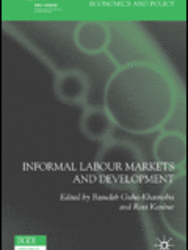Book
Informal Labour Markets and Development
This book presents significant new research on the informal labour markets of developing countries. Examining the critical role of informal labour markets in allowing countries to adjust successfully to the forces of globalization, this volume also brings to the fore a number of problems associated with the expansion of informal employment, such as poor working conditions, the lack of worker protection and the proliferation of urban slums. Comprising theoretical and empirical case studies from Africa, Asia, Central Europe and Latin America, it facilitates comparisons across developing countries from diverse geographical areas.
 Join the network
Join the network